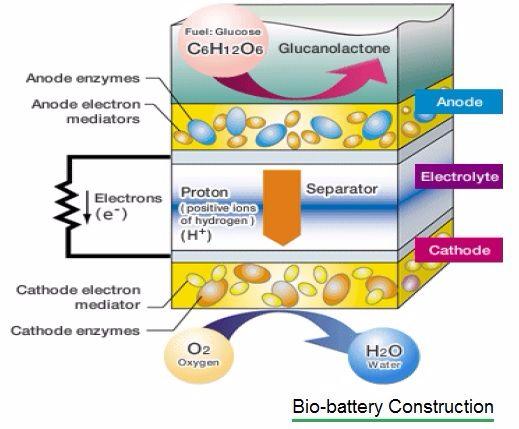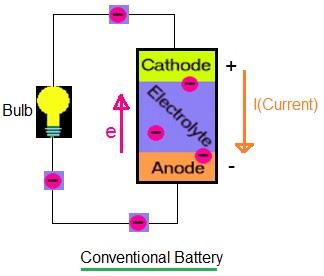Bio Battery vs Conventional Battery: Key Differences
Advertisement
This page compares Bio battery vs Conventional battery and mentions the difference between Bio battery and Conventional battery.
Bio Battery

Bio battery construction
Following are the features of a Bio-battery:
- Made of layers e.g. anode, cathode, electrolyte and separator.
- Biological enzymes are used for anode and cathode as catalysts. Enzymes and electronic mediators are fixed on both cathode and anode terminals.
Conventional Battery

conventional battery operation
Figure 2 depicts the operation and construction of a conventional battery. As shown, there are three parts in a battery viz. anode, cathode, and electrolyte. Anode and cathode are connected to an electrical circuit or device.
Chemical reactions cause the build-up of electrons in the anode, which results in an electrical difference between the cathode and anode. Electrons try to re-arrange themselves to avoid this difference.
In order to get rid of this difference, electrons repel one another and try to flow towards a place having fewer electrons, which is the cathode. Electrolyte prevents them from flowing directly from anode to cathode in the battery.
As a result, electrons flow from anode to cathode when the circuit is closed (i.e. a wire is connected between cathode and anode). When the electrons flow through the wire, it will light the bulb as shown.
Due to the electro-chemical process, chemicals will change in the anode and cathode. Due to this, they stop the supply of electrons. As a result, a limited amount of power will be left in the battery. This requires us to recharge the battery.
When we re-charge the battery, electro-chemical processes happen in reverse. This will restore the anode and cathode to their initial state and they will deliver the power once again.
Bio-battery vs Conventional Battery
The following table mentions the difference between a Bio-battery and a conventional battery.
| Specifications | Bio-battery | Conventional battery |
|---|---|---|
| Recharging | Very quick due to the use of glucose. | Cannot be charged quickly. |
| Source of energy | Clean and non-toxic | Polluting and toxic |
| Explosions and leakage | No, and hence they are safe to use. | Yes |
| Construction | As mentioned above. |
Advertisement
 RF
RF






